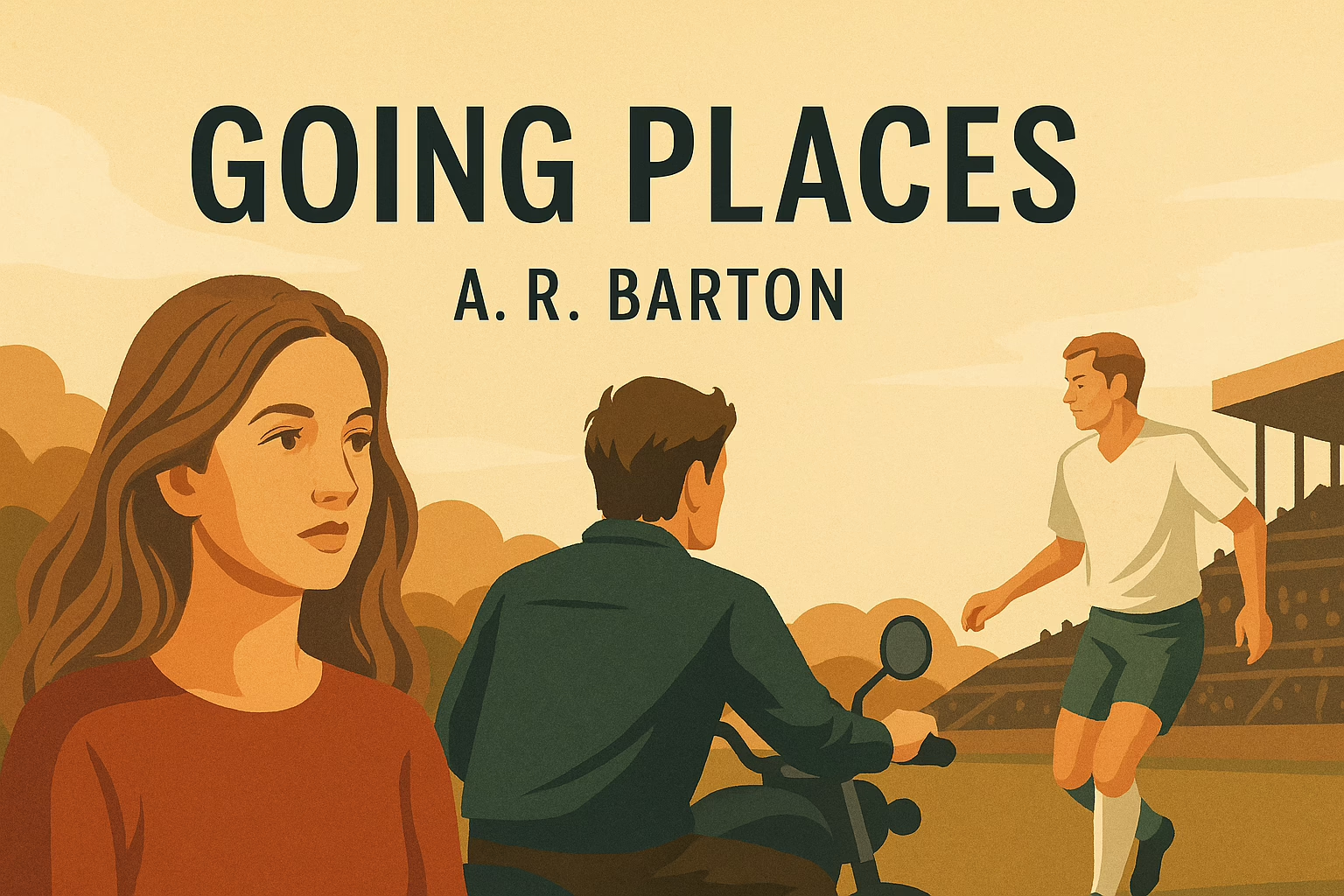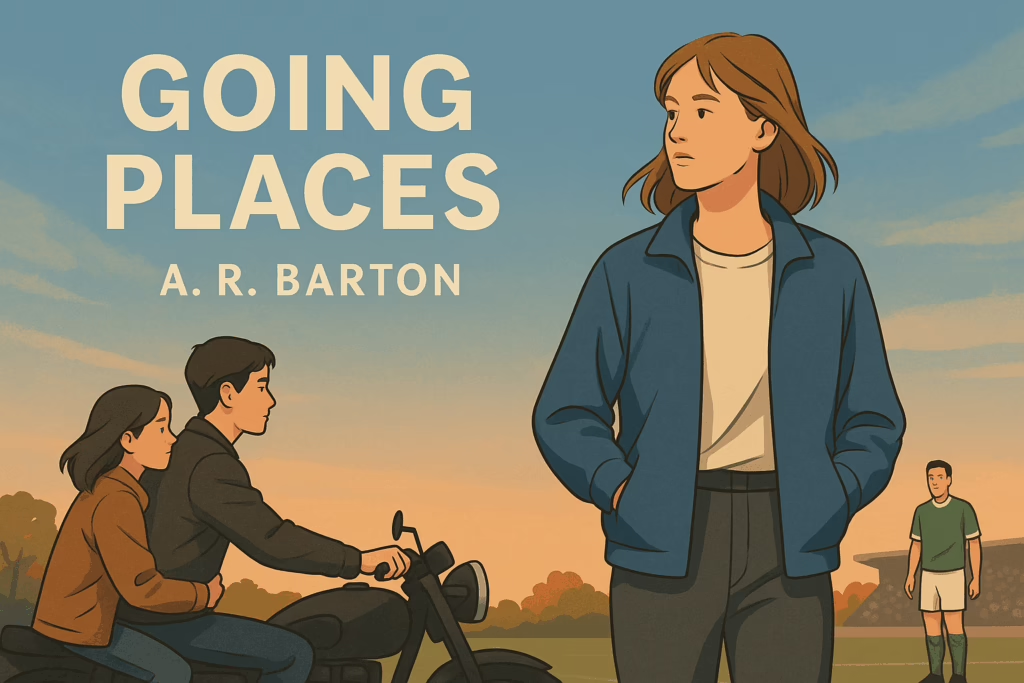SUMMARY — Going Places
“Going Places,” written by A. R. Barton, explores the themes of teenage fantasy, hero worship, and the difference between dreams and reality. The story centres on Sophie, a schoolgirl from a poor family who constantly dreams of a glamorous future far beyond her circumstances. Although she is destined to work in a biscuit factory after finishing school, she imagines owning a boutique, becoming an actress, or living a fashionable life.
Sophie’s closest confidante is her brother Geoff, a quiet, older boy who represents the wider, mysterious world outside her limited environment. She admires him deeply and longs to be included in the exciting life she imagines he leads. Trying to impress him, she invents a story about meeting the famous Irish footballer Danny Casey, whom the whole family idolises. Geoff is unsure whether to believe her, and their father dismisses the story as another one of her wild fantasies.
Despite knowing deep down that the meeting never happened, Sophie convinces herself that Casey promised to meet her again. She waits for him desperately, but he never comes. Her disappointment reflects the painful clash between her imaginative world and harsh reality.
Through Sophie’s daydreams and subsequent heartbreak, the story highlights the struggles of adolescence—especially the longing to escape ordinary life, the excitement of hero worship, and the emotional vulnerability that accompanies unrealistic dreams. It gently reminds readers of the importance of balancing ambition with realism.
About the Author — A. R. Barton
A. R. Barton is a contemporary writer known for his short stories that explore human emotions, everyday struggles, and social realities with subtlety and insight. Although not much is publicly documented about his personal life, his writing reflects a deep understanding of ordinary people and their inner conflicts. His stories often focus on themes such as aspirations, class differences, family relationships, and the gap between dreams and reality.
In Going Places, Barton captures the delicate emotional world of adolescence through the character of Sophie, portraying her fantasies, disappointments, and longing for a life beyond her circumstances. His simple, realistic style and sensitive portrayal of youth make the story both relatable and thought-provoking for readers.
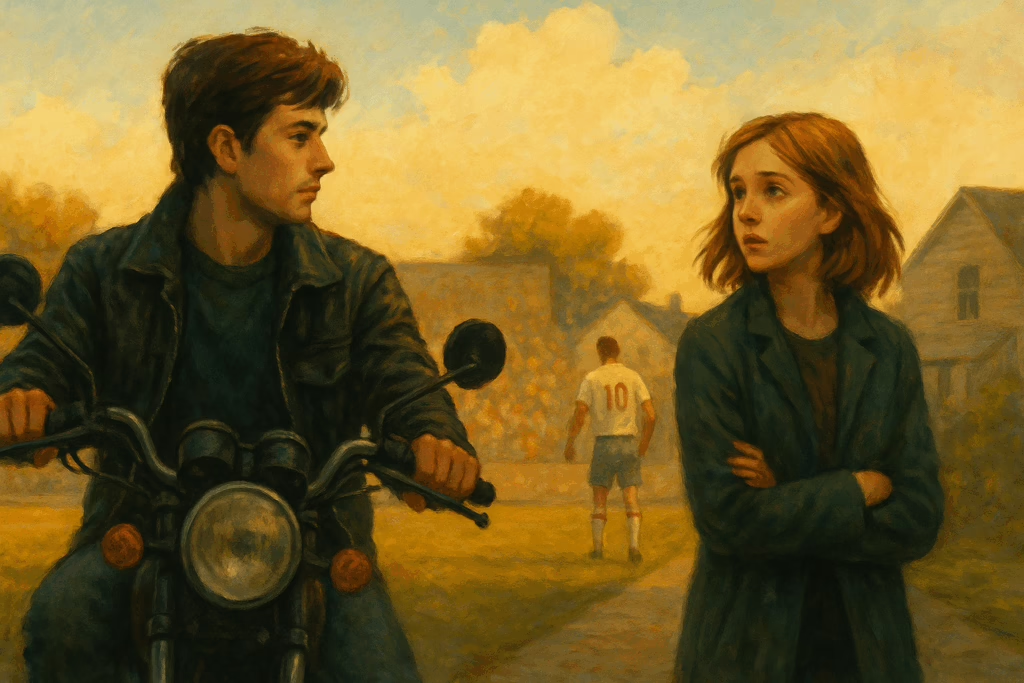
Textual Questions and Answers
THINK AS YOU READ — (Page 77)
1. Where was it most likely that the two girls would find work after school?
It was most likely that Sophie and Jansie would both find work in the biscuit factory, since they had already been “earmarked” for it.
2. What were the options that Sophie was dreaming of? Why does Jansie discourage her from having such dreams?
Sophie dreamed of having a boutique, becoming a manager, working as an actress, and even becoming a fashion designer. Jansie discouraged her because all these dreams required money and sophistication, whereas both girls came from poor families and were destined for factory work, making such ambitions unrealistic.
THINK AS YOU READ — (Page 79)
1. Why did Sophie wriggle when Geoff told her father that she had met Danny Casey?
Sophie wriggled because she knew her father would not believe her story and might scold her for making up “wild stories.” She felt nervous and embarrassed.
2. Does Geoff believe what Sophie says about her meeting with Danny Casey?
Geoff does not fully believe her, but he wants to believe her. He finds the story “unlikely,” yet he listens and questions her with curiosity.
3. Does her father believe her story?
No. Her father dismisses it as “another of her wild stories.” He is convinced that Sophie is making it up.
4. How does Sophie include her brother Geoff in her fantasy of her future?
Sophie imagines riding behind Geoff on his motorcycle into a glamorous world beyond her reach. She dreams that he will someday take her into the wider world he himself experiences—symbolising her desire to escape poverty.
5. Which country did Danny Casey play for?
Danny Casey played for Ireland.
THINK AS YOU READ — (Page 83)
1. Why didn’t Sophie want Jansie to know about her story with Danny?
Sophie didn’t want Jansie to know because Jansie was “nosey” and would spread the story everywhere. Sophie wanted it to remain a secret between her and Geoff.
2. Did Sophie really meet Danny Casey?
No. Sophie never actually met Danny Casey. The meeting existed only in her fantasy. She longed for excitement and escape, so she imagined the encounter vividly.
3. Which was the only occasion when she got to see Danny Casey in person?
The only time Sophie actually saw Danny Casey was at the football match, where he scored a goal. Beyond this, all other details came from her imagination.
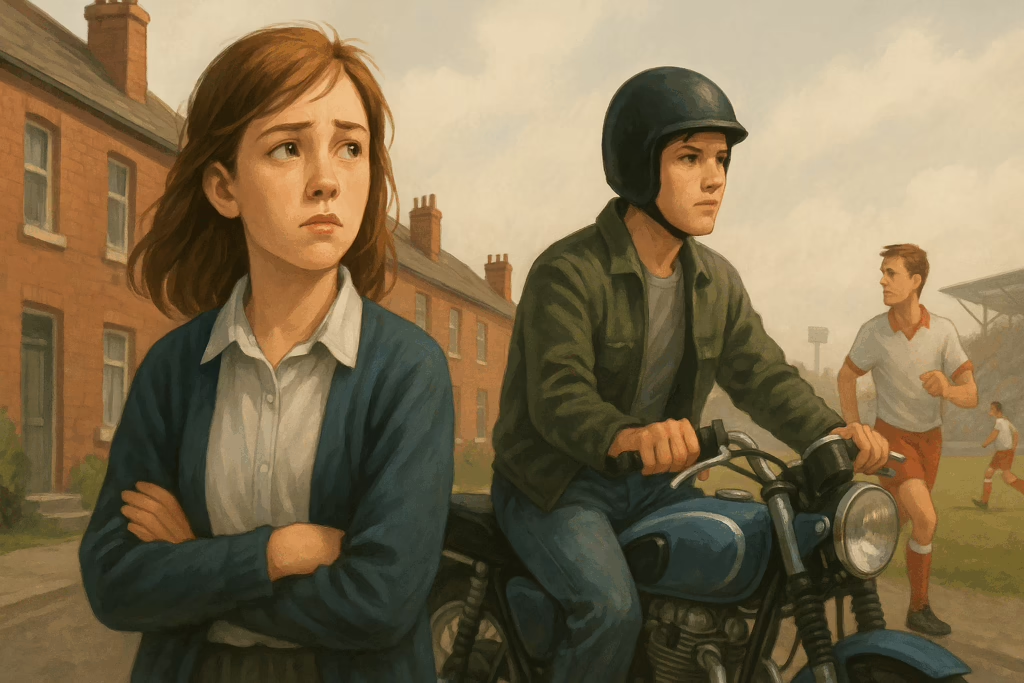
UNDERSTANDING THE TEXT — (Page 83)
1. Sophie and Jansie were classmates and friends. What were the differences between them?
Sophie was a dreamer, imagining unrealistic futures like boutiques, acting, and meeting a sports star. Jansie, on the other hand, was practical and realistic. She knew their families were poor and that both girls were destined for factory work. She discouraged fantasy, whereas Sophie lived in it.
2. How would you describe the character and temperament of Sophie’s father?
Sophie’s father was a hard-working, rough, practical, no-nonsense man. He dismissed Sophie’s stories as childish fantasies, believed in hard reality, and disapproved of her daydreaming. He enjoyed football and the pub, showing little patience for Sophie’s imagination.
3. Why did Sophie like her brother Geoff more than any other person? What did he symbolise?
Sophie admired Geoff because he was quiet, mature, and connected to a world beyond her own. He symbolised the larger, exciting world she dreamed of entering. She longed to be part of his unknown life and adventures.
4. What socio-economic background did Sophie belong to? What are the indicators?
Sophie came from a poor, working-class family. Indicators include:
- cramped, steamy kitchen
- dirty washing piled in corners
- father’s greasy work clothes
- being destined for factory work
- mother always tired and stooped
These show financial struggle and limited opportunities.
UNDERSTANDING THE TEXT — (Page 83, Right Column)
1. Why didn’t Sophie want Jansie to know about her story with Danny?
She feared Jansie would spread the news everywhere, causing trouble and exposing her fantasy.
2. Did Sophie really meet Danny Casey?
No. It was only her imagination; the meeting never happened.
3. Which was the only occasion when she got to see Danny Casey in person?
At the football stadium during the match where he scored.
TALKING ABOUT THE TEXT — (Page 84)
(Model Answers for Discussion Questions)
1. Sophie’s dreams and disappointments are all in her mind.
Yes. Sophie constructs an imaginary world to escape her dull, poverty-stricken reality. Her excitement, her belief that Danny Casey would meet her, and her later disappointment all exist only in her imagination.
2. Benefits and disadvantages of teenagers’ unrealistic dreams.
Benefits:
- enhance creativity
- motivate ambition
- provide emotional escape
Disadvantages:
- lead to frustration
- create unrealistic expectations
- weaken focus on real goals
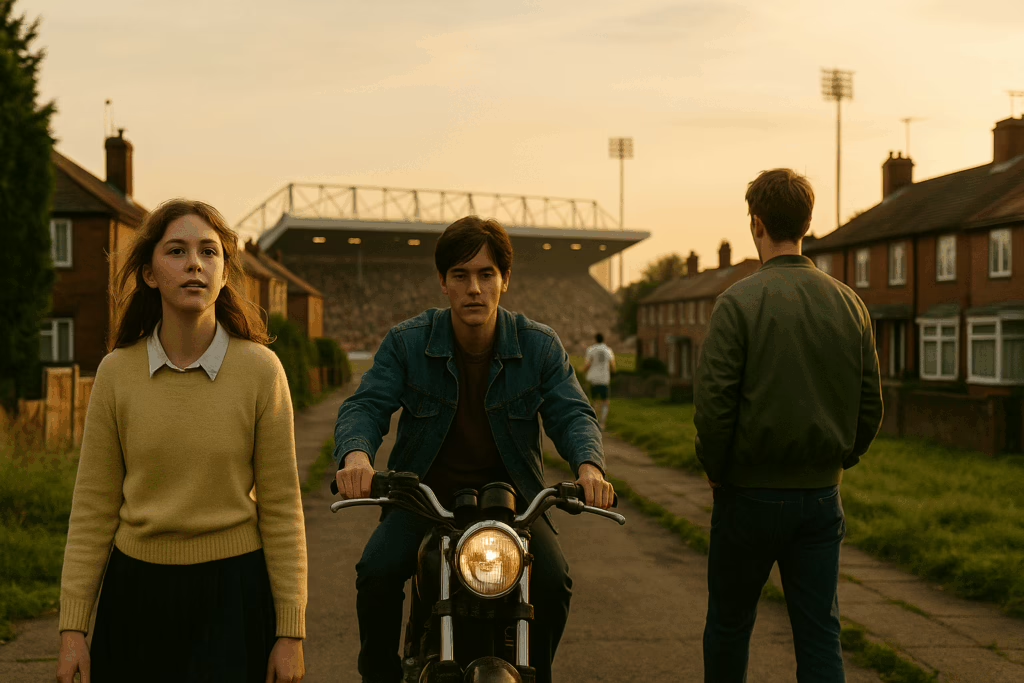
WORKING WITH WORDS — (Page 84)
Explain the metaphorical expressions:
• “Words had to be prized out of him like stones out of a ground.”
Geoff spoke very little; getting him to talk was extremely difficult.
• “Sophie felt a tightening in her throat.”
She felt emotional tension and discomfort.
• “If he keeps his head on his shoulders.”
If he stays sensible and avoids distractions.
• “Weekly pilgrimage to the United.”
Their visit to watch United play was regular and deeply meaningful, like a ritual.
• “He ghost past the lumbering defenders.”
Danny Casey moved swiftly and smoothly past the slow defenders.
NOTICING FORM — (Page 84)
Pick out five sentences with present participles showing simultaneous actions:
- “Linking arms with her along the street, Jansie looked doubtful.”
- “Staring far down the street, Sophie said…”
- “Leaving Jansie standing in the rain, she turned into the house.”
- “Coming through the arcade, she pictured him again.”
- “Watching along the canal, she imagined his coming.”
THINKING ABOUT LANGUAGE — (Page 85)
Ten colloquial / informal words like ‘chuffed’, ‘nosey’, ‘gawky’:
- bloke
- fancy
- mate
- dodgy
- rubbish
- cheeky
- damn
- nicked
- lousy
- skint
WRITING — (Page 85)
Write points/questions for interviewing your role model (Model):
Role Model: A famous sportsperson.
Questions:
- What inspired you to take up this sport?
- What difficulties did you face in your early journey?
- Who has been your biggest supporter?
- What does a typical training day look like?
- How do you handle pressure before major matches?
- What advice would you give aspiring young athletes?
- What goals do you still want to achieve?
THINGS TO DO — (Page 85)
Stories/Movies with similar themes of hero worship:
- Fan (Hindi movie) – obsession with a film star
- Bend It Like Beckham – football hero inspiration
- Secret Superstar – teenage dreams vs reality
- The Karate Kid – admiration for a mentor
- Iqbal – dreams of meeting cricket heroes

